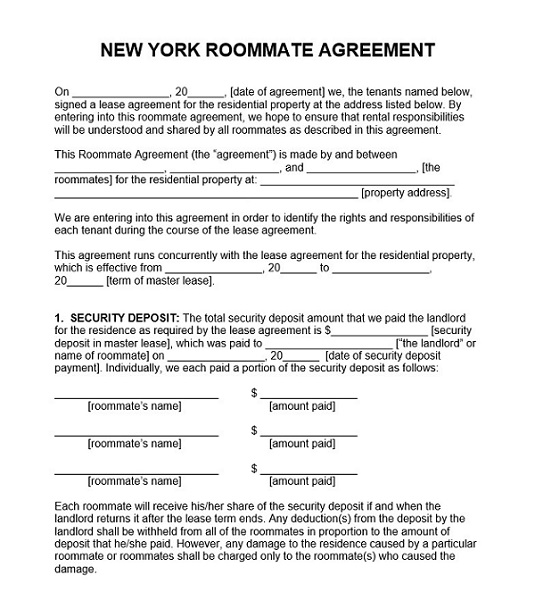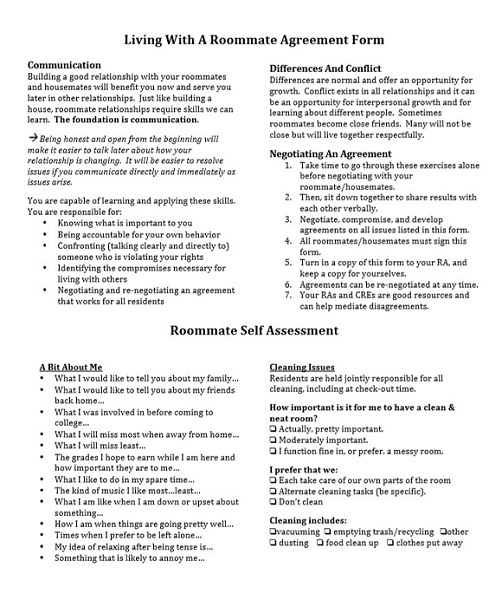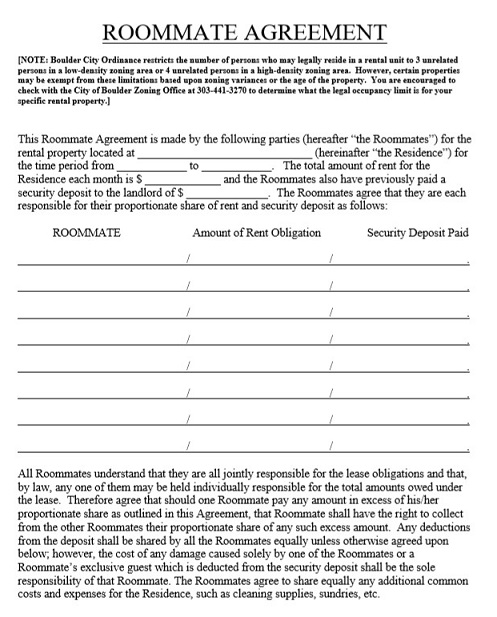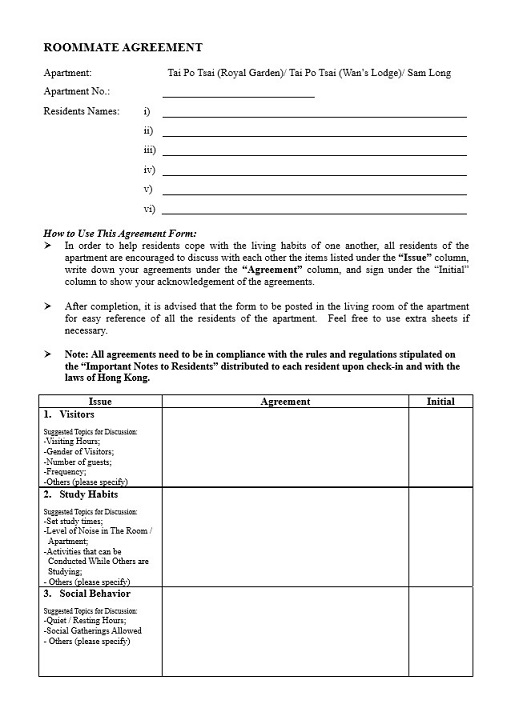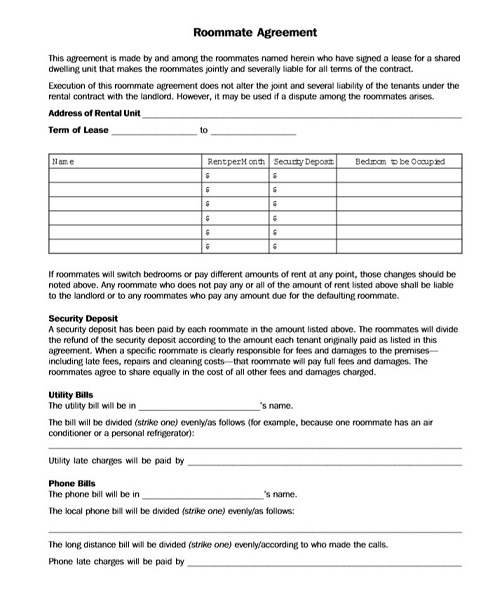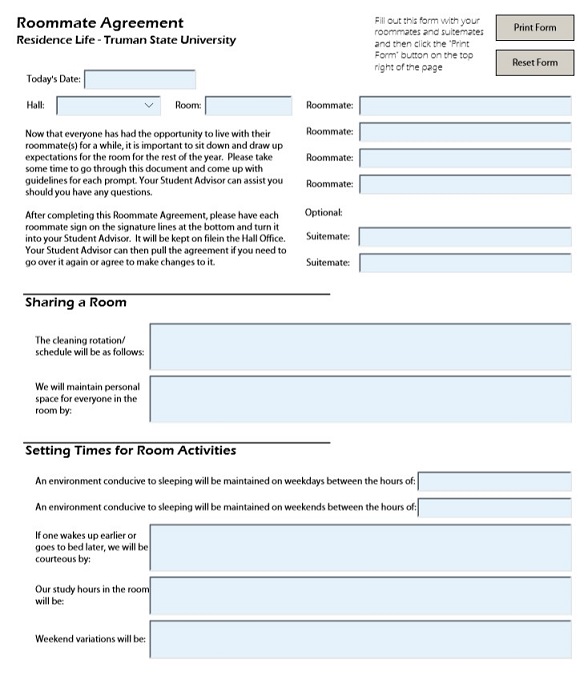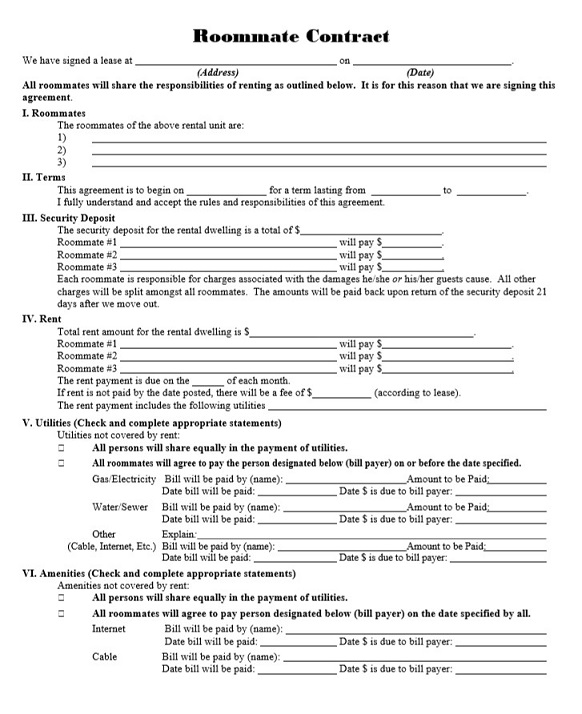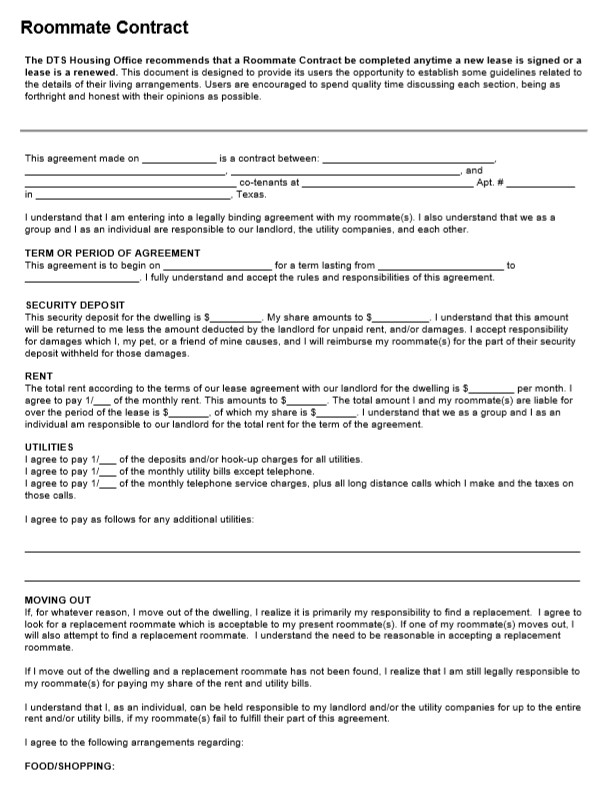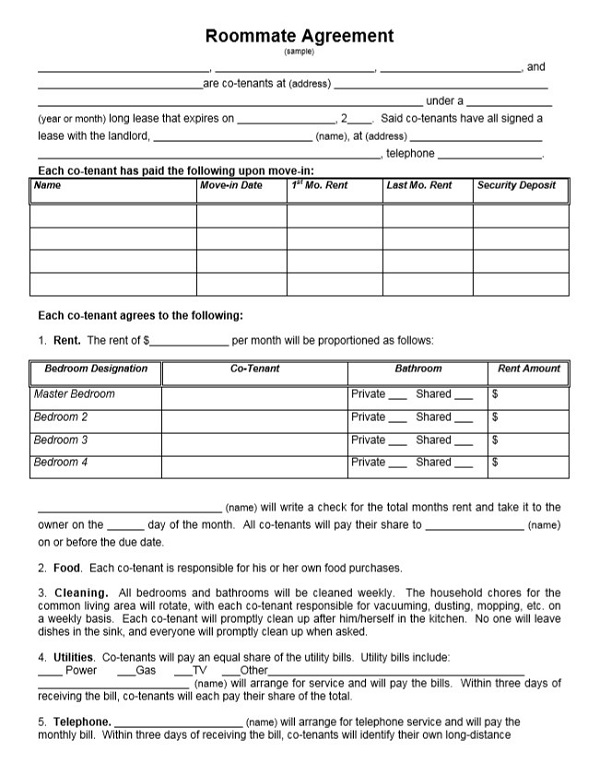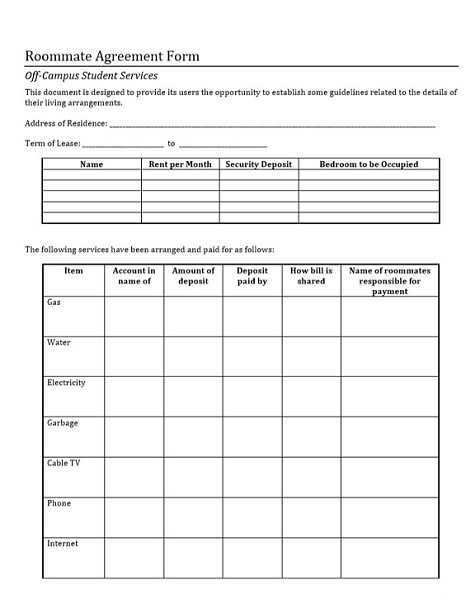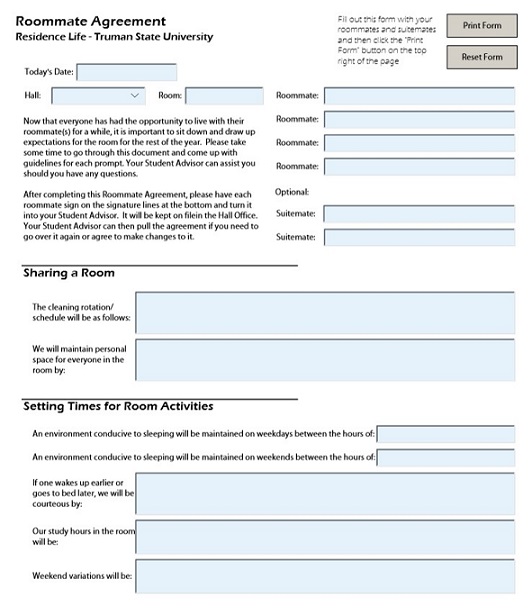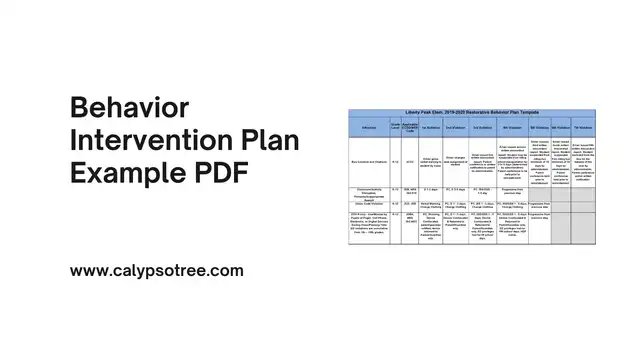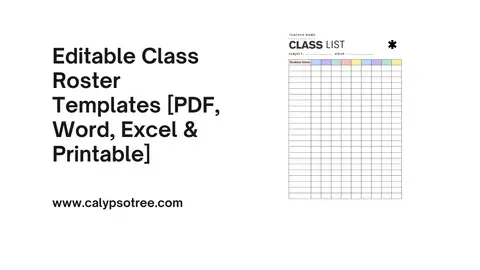Having a roommate agreement is essential for creating a positive and peaceful living environment. A roommate agreement is a written contract that outlines the rights and responsibilities of each roommate. It can help prevent conflicts and misunderstandings by setting clear expectations and boundaries for all roommates.
Key Components of a Roommate Agreement
A comprehensive roommate agreement should include the following key components:
- Personal information of each roommate: This should include the full name, contact information, and any other relevant details of each roommate.
- Division of responsibilities: The agreement should outline how household tasks, such as cleaning and grocery shopping, will be divided among roommates. It should also specify who is responsible for paying bills and utilities.
- Guest policies: The agreement should outline the rules and expectations for guests, including how long they can stay and whether they are allowed to stay overnight.
- Quiet hours and overnight guests: The agreement should specify quiet hours, during which roommates should avoid making excessive noise that may disturb others. It should also outline the rules for overnight guests, including whether they are allowed and how many are permitted.
- Substance use policies: The agreement should outline the rules for substance use, including whether alcohol and drugs are permitted in the shared living space.
- Pet policies: If any of the roommates have pets, the agreement should outline the rules for pet ownership, including whether pets are allowed in the shared living space and who is responsible for taking care of them.
- Termination clause: The agreement should include a clause that outlines the process for terminating the agreement, including notice requirements and any other relevant details. This can help prevent misunderstandings and conflicts if a roommate decides to move out.
Tips for Negotiating and Enforcing a Roommate Agreement
A roommate agreement is a contract between roommates that outlines the rights and responsibilities of each person living in a shared space. It can help prevent misunderstandings and conflicts by clearly defining each person’s expectations and obligations. When negotiating and enforcing a roommate agreement, here are some tips to keep in mind:
Start the conversation early: It’s best to discuss the terms of the roommate agreement before moving in together. This will give you time to discuss and come to an agreement on important issues, such as how to split bills, who is responsible for cleaning, and how to handle overnight guests.
Be open and honest: When negotiating the terms of the agreement, be open and honest about your expectations and needs. If you have any concerns, don’t be afraid to raise them. It’s important to address potential conflicts before they arise.
Put everything in writing: A written agreement can help prevent misunderstandings and provide a reference point if conflicts do arise. Make sure to include details such as each person’s share of the rent and utilities, how to handle household chores, and how to resolve disputes.
Communicate openly and frequently: Good communication is key to maintaining a healthy roommate relationship. If there are any issues or concerns, be sure to discuss them openly and honestly. If necessary, consider setting up regular check-ins or meetings to discuss the terms of the agreement and address any problems that may arise.
Enforce the agreement: If one of your roommates is not upholding their end of the agreement, it’s important to address the issue. Be firm but fair, and remind them of the terms of the agreement. If necessary, consider involving a mediator or legal professional to help resolve the issue.
The Importance of Creating a Roommate Agreement
Having a roommate can be complicated sometimes, especially if you don’t him or yet. Both of you have to communicate everything before being a roommate. To strengthen the rules, it is also necessary for you to create a roommate agreement. Just check the reasons below why you have to create a roommate agreement.
Create Clear Rules
Creating a roommate agreement is a valuable thing to have clear rules while both of you are in the room. For example, by using the agreement, you know the border between your area and his or her area in the room. Moreover, you can also have a clear rule about the way you pay the rent, things that he or she can’t borrow from you, and many more.
Avoid Problems
Just imagine if you don’t have an agreement. Your roommate can pass your area and take everything they want without any permission from you. They might bring their friends to the room without an agreement with you. The case will be different if both of you have a clear roommate agreement. The agreement is able to avoid problems in the future when both of you are a roommate. If you want to create it right away, you can just download a roommate agreement template for free and use it.
Know the Do and Don’t Clearly
The agreement is also useful to know the list of the do and don’t while in the room clearly. Let say, you can manage the volume of music, time to bring friends, and many more. The point of the agreement is to make both of you feel comfortable in the room and also when both of you becoming a roommate. You can include a roommate agreement form to make the list of the do and don’t in the agreement.
Have a Strong Authority
The roommate agreement is a strong rule for both of you. The agreement arranges everything including the punishment if one of you break the rules. That’s why, you can include some of the simple punishments such as cleaning the room, washing clothes, sharing foods, or anything if both of you break the agreement. You may check a roommate agreement sample which covers everything you need to include to create a legal and beneficial agreement.
The point of creating a roommate agreement is to give clear rules as a roommate. It helps to make both of you comfortable while being a roommate. As a result, you can limit a chance of problem or conflict with your roommate.
Benefits of Roommate Agreement
It also known as a cohabitation agreement or a room rental agreement, is a contract between roommates that outlines the rights and responsibilities of each person living in the shared space. It can help ensure that everyone is on the same page and knows what to expect from each other, which can prevent misunderstandings and conflicts. Some potential benefits of having a roommate agreement include:
Clarifying expectations and responsibilities: It can help roommates clearly communicate and agree on things like how to divide rent and bills, who is responsible for what chores, and what hours are quiet hours. This can help prevent misunderstandings and conflicts.
Protecting your rights: It can help protect your rights as a tenant and ensure that you are not taken advantage of by your roommates. For example, if one roommate consistently fails to pay their share of the rent on time, a roommate agreement can provide a legal basis for taking action against them.
Avoiding disputes: A well-written roommate agreement can help prevent disputes by clearly outlining how certain situations will be handled. For example, if one roommate wants to have overnight guests regularly, the agreement can specify how many nights per week they are allowed to do so, and under what circumstances.
Establishing boundaries: It can help establish boundaries and set clear expectations for how roommates will interact with each other. This can help create a more harmonious living environment and ensure that everyone feels comfortable and respected in their own home.
Overall, having it in place can help create a more organized, peaceful, and respectful living environment for everyone involved.
Conclusion
In conclusion, a roommate agreement can help prevent misunderstandings and conflicts in a shared living space. By starting the conversation early, being open and honest, putting everything in writing, communicating openly and frequently, and enforcing the agreement, you can help ensure a successful and harmonious living situation.

The content creator team at calipsotree.com is dedicated to making topics accessible to everyone, with over 9 years of experience in writing and breaking down complex concepts into easy-to-understand articles that answer readers’ financial questions.






